
It’s back!
Nine months after another forgettable Christmas special which Steven Moffat probably wrote in an afternoon, Doctor Who blasted back onto our screens in traditionally explosive fashion. There was excitement, confusion, fun, irritance and a slight bit of, “why does that guy look like a shrivelled ballsack?”. The Magician’s Apprentice was a very bombastic episode, perhaps too big for its boots. In the first of many reviews to come, let’s take a look at how well this held up as a series premiere.
In recent years, Steven Moffat realised that you can do pretty much anything with time, and therefore you can do pretty much anything with Doctor Who. There was a grand sense of scale to Russell T. Davies’ era; there was a strict formula that each series followed from plot structure to episodes themselves (episodes 4/5 were always a two-parter, as were 8/9), with little hints of an overarching storyline dropped in every few weeks. This culminated in a big two-parter finale where everything fell into place – often involving the Daleks – and then it was business as usual in the next year. While it was certainly a distinct pattern, it worked. Almost all the episodes in a series were fun standalone stories that still hold up today (well, most of them), with the important bits left until the end. Basic storytelling logic says this is the way to go as it builds up suspense and intrigue, turning Davies’ work into a winning formula. Moffat doesn’t do any of that.
Because when you think about it, you really can do anything with time. A friend of yours dies? Simple: just travel back in time and save them. They’re trapped on ancient Earth? Simple: just leave a message somewhere for somebody in the future to see and then use to go back and save them, bypassing hundreds of years of waiting time. This is all fairly convenient, and the worst part is that it’s all perfectly feasible with a time machine – so why hasn’t it happened before? In fifty years, no writer has abused the power of time travel as much as Moffat. It’s something to be regulated and restricted for the sake of the narrative, so the audience actually feels engaged. On the flipside, there’s a whole host of fun things you can do through its abuse, so why not shake things up a bit and do it?
That’s what Moffat has been doing since 2010, and last night it finally got too much to bear.
That wasn’t because it did anything which necessarily tipped it over the edge. In terms of time-travel-wackiness, it was fairly standard for Moffat; it just finally reached the point where you sit back and realise, “what the fuck is this?” The thing is, it’s popcorn. Bubblegum. Cheap writing tricks to entertain you in a forty-five minute space so you don’t get bored and go make a cup of tea instead. From the Pandorica shenanigans in The Pandorica Opens/The Big Bang, saving River Song as she jumps out of a building into the TARDIS in Day of the Moon, Clara saving three Doctors in a Medieval cell from present-day London in The Day of the Doctor, all the way to the sudden return of Missy and Davros in The Magician’s Apprentice, Moffat has established that time is completely flexible and free to play around with (except when it comes to actor’s contracts running out). For that initial viewing, it completely works. You’re stuck in a trance, in awe of his ability to create such a grand and busy plot simply through the use of time travel. It’s only after a couple of hours of reflection that you realise it’s completely ridiculous.
But! More on that later. Now – the episode.
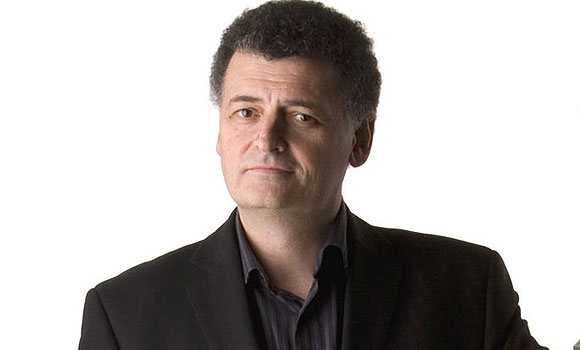
I really enjoyed it. It was busy, bouncing from the Maldovarium to the Shadow Proclamation to Karn to London to Medieval Essex to Skaro all in the space of about twenty minutes, never letting itself slow down for any of them. That busy-ness gives the show a sense of confidence, which is great. It’s been going on so long now that there’s very little chance for millions of first-time viewers to be tuning in, so it can afford to just pick up old (one was decades old) story threads in such obnoxious fashion. However, just because it can, does that mean it should?
Hettie MacDonald did well with bringing to life such a variety of locations and not letting us get lost in the thick of it all. She also brought out some pretty fun and bouncy performances from Peter Capaldi, Jenna Coleman and Michelle Gomez; you can tell they all have tremendous chemistry and they’re just having the time of their lives being there, adding to that overall sense of confidence. They’re embracing the wacky nature of the show, as is Moffat, who is having the most fun of all. He’s like a kid who gets to open all his presents on Christmas Eve and show off to the neighbours. Ood! Judoon! Daleks! Davros! Missy! It was like an orgasm of classic and new elements that only the biggest of fans could conjure up. Decades and hundreds of episodes in, Doctor Who can afford to do this. But again – should it?
The answer is no.
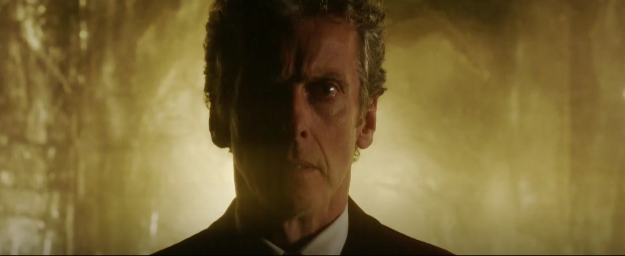
Logical narratives and suspense are a thing of the past on Doctor Who. Excitement and adrenaline, however, are in no short supply. Even The Day of the Doctor, which I adore, makes little sense when it comes to its plot. The worst part is that Moffat knows this. He’s totally aware that this shit is absolutely insane and nonsensical, but it’s dressed up nicely so people don’t immediately notice. Let’s actually break down the plot of The Magician’s Apprentice.
Somehow, the Doctor ends up on a war-torn Skaro and meets Davros as a child, but he doesn’t know where he is at first and it’s not explained what he’s actually doing there. Once the kid reveals who he is, the Doctor goes into hiding for some reason. Kid Davros has the Sonic Screwdriver which then stays with him right until the end of his life – does this mean that, throughout all of their adventures, he always had it? If so, then why didn’t he whip it out as soon as he met Tom Baker in Genesis of the Daleks? That would be the Harry Potter and the Prisoner of Azkaban approach to things. Or, in the original scenario the Doctor never appeared on Skaro, meaning he didn’t wind up in possession of the Sonic. It’s only through his arrival there that Davros gets it, but even then it gets a little messy. So does this rewrite Davros’ whole future so he DOES have the Sonic throughout his life, or does the rest of time remain as it is because that isn’t how things worked out from the Doctor’s perspective?
And this is all in the first five minutes.
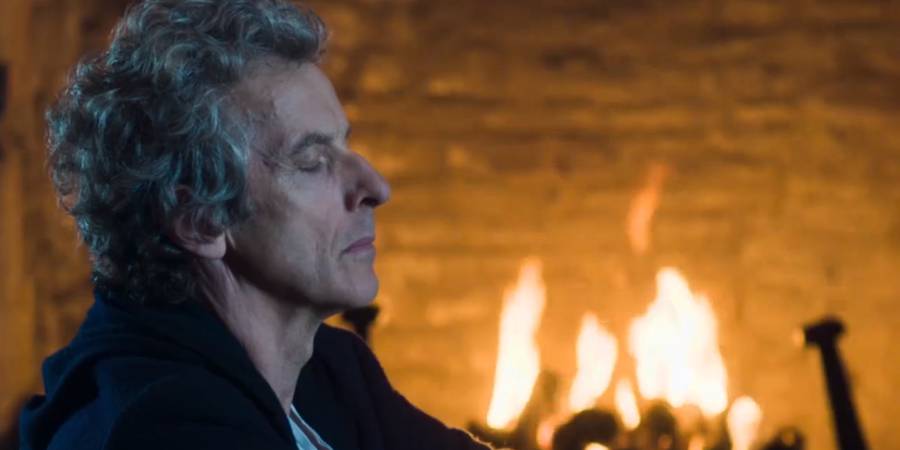
A strange hooded snake then travels around looking for the Doctor because Davros wants him, although it’s never really explained why. If time is as flexible as the plots suggest then why doesn’t the snake go find one of the previous Doctors and bring him to Davros? Yeah, the Daleks don’t have any time-travelling-capabilities but there’s probably one Doctor or another running around in whichever year they’re in. Or, better yet, why didn’t Davros just give him the Sonic back in Genesis of the Daleks? This is strictly from an in-universe perspective; God forbid Moffat actually try and figure out a way to rewrite Classic Who.
For some reason, Missy makes all the planes in the world freeze, presumably to get UNIT’s attention (although she could have just gone straight to the ‘Doctor Channel’). She then offers up a brief explanation for why she isn’t dead (“not dead, back, big surprise, never mind”) and demands to see Clara in some foreign country before 4PM, which would be a little difficult if all the planes have stopped working but hey, plot! She then whips out a confession dial to be opened upon the Doctor’s death, only popping up here because Moffat didn’t think of it when writing the ‘Silence will Fall’ arc. He really likes writing about the end of the Doctor, doesn’t he?
UNIT then disappear and Moffat introduces a deux ex machina to get Clara and Missy to Medieval England (because Clara magically forgave her for the whole killing-Danny thing) where the Doctor rides into a castle playing an electric guitar on a tank with complete disregard for the fabric of human history. Snake Guy then appears and whisks them all away to Skaro – which has somehow been rebuilt since it was, y’know, blown up – and it’s revealed that the knight the Doctor was facing is actually a Dalek agent who captures the TARDIS, because he couldn’t do that during the three weeks it was sitting there previously.
And then the episode finally starts to get good – in the last fifteen minutes. Davros and the Doctor have a good ol’ heart-to-heart about the nature of compassion and reminisce about old times, shaming the Doctor for abandoning him as a kid. Missy and Clara also wonder about a bit and discover that they’re actually on Skaro, before getting captured by the Daleks. Missy then tries to convince them to partner up with her and wreak havoc with the TARDIS, but they exterminate her. Then they exterminate Clara. Then they destroy the TARDIS. Then it ends.

It’s completely ridiculous, isn’t it?
Moffat had a good idea in making a spiritual sequel to Genesis of the Daleks – should the Doctor kill Davros as a child? It would literally stop the Daleks from ever existing. Imagine that. A Dalek-free universe. Everything would be completely different, and the prospect must be so unbelievably tantalising for him. At the same time, it means killing a child – is it worth it? Breaking everything that the Doctor stands for? Obviously, he can’t bring himself to do it, however it’s arguable that dangling hope in front of Kid Davros’ face could have inspired his eventual hatred of all things good and creation of the Daleks, making the entire situation a hell of a lot worse. The Doctor then realises this and heads back in time to kill him – wait, how did he do that?
All of that stuff is interesting. It’s meaty, adding a completely new dimension to the relationship between the Time Lord and his greatest enemies. If that had been the entire episode then it would have been a hell of a lot better, but instead we had to sit through literally pointless filler with UNIT and psuedo-Mos Eisley and Medieval England. Cut out all of that, the confession dial subplot and Missy (whom I think is great but was totally unnecessary) and you still have the same story which the episode promised from the beginning and finally got around to at the end, but it suddenly becomes a much more thrilling opener. Moffat clearly wants punch, in a stark contrast to the Series 8 premiere, Deep Breath, but he becomes so focused on the punch that he loses sight of the main plot.
And that’s a big problem. Completely screwing around with time is bad enough, but when it allows the episode to become distracted by itself it becomes a whole lot worse. If it weren’t for the talented direction, evocative cinematography, entrancing score and lively acting then Doctor Who would be fucking awful, but fortunately everything except the plot is class. I define it as the plot because when it comes to thematic and character material, Moffat is still good. The Davros story is a good idea and it’s awesome, so why couldn’t we just focus on that? Especially because that is supposed to be the main plotline.
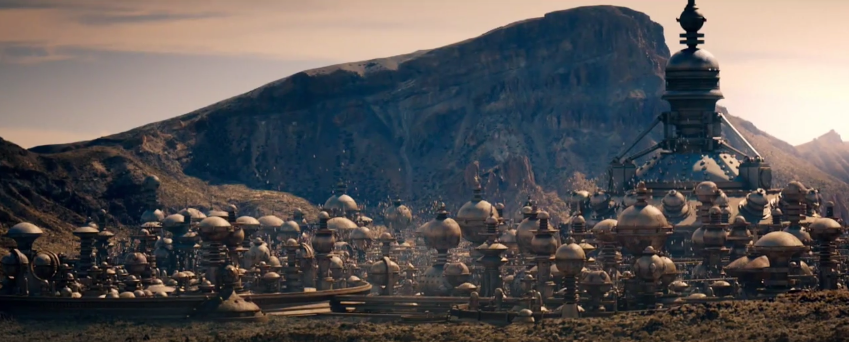
Because all of the other stuff is so good, it makes the writing look better than it is which then leads to the cries of “bravo Moffat!” from the fandom. Like I said, it’s just popcorn and bubblegum; a quick adrenaline rush with a hell of a lot of punch to get you engaged in Doctor Who again, but quickly becomes forgettable. His episodes under Russell T. Davies are some of the best ever. Out of all the ones he’s written himself since 2010, I can pick out a handful that I’ll want to rewatch in the future.
Someone really, really needs to restrain him. There’s no explanation for Missy or Davros or Skaro being there which has been a problem throughout his reign; villains and characters will just reappear because he wants them to and “because time travel”. Davies was no master and had a lot of faults but he at least made a big deal out of these iconic figures as befit their status; whenever any villains popped up again there was always some sort of reason behind it, and then they would go away for a bit. Even though the Daleks appeared every year it still felt like an event because there was reasoning and logic behind it; the Cult of Skaro are some super-Daleks from the Time War who escape the war with the Cybermen to land in Manhattan and then one escapes again, leading to Davros’ return. Three clearly defined stories, three years apart, that all naturally lead on from the other. With Moffat, the Daleks showed up in World War Two and some new colourful ones were introduced who were then barely shown again because he got bored of them. Then there was a Dalek parliament in Asylum of the Daleks because why not, and now they’re on Skaro. It’s all messy and bouncy and ridiculous, and the fluctuating schedule for three years didn’t help matters.
Again, he knows this, and it seems as if he feels messy, wibbly-wobbly-timey-wimey stories are what makes Doctor Who great which is just wrong. What makes it great is the same as all other shows and movies; good, enduring characters with engaging narratives. Neither showrunner has properly delivered on that, but I’m desperately hoping the next one does. This show holds a special place in my heart and I love it to bits, and it’s painful to see it treated in such a manner.
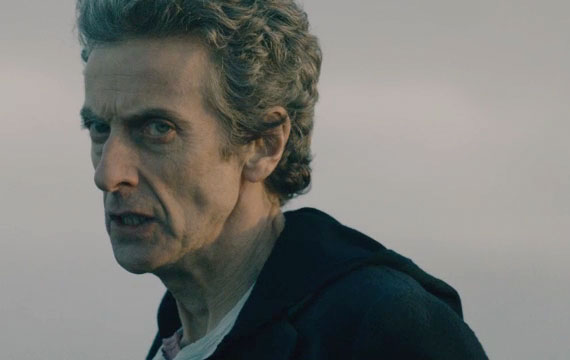
I enjoyed The Magician’s Apprentice, but I did not like it. If I were to go into everything I didn’t like then we’d all be here for a lot longer. If I wanted to watch a great episode of Doctor Who then I’ll put on Blink or The Doctor’s Wife – hey, maybe even Genesis of the Daleks. Kick this show in the ass and give it some energy, of course, but please do so in a manner which will hold up and make sense. Hopefully next week’s The Witch’s Familiar will do just that.







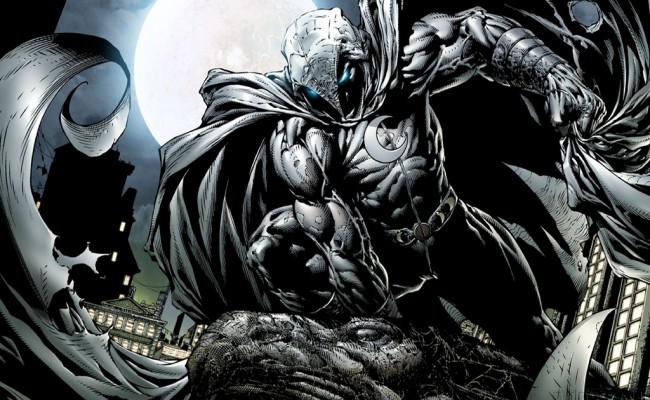



S#!T Talking Central